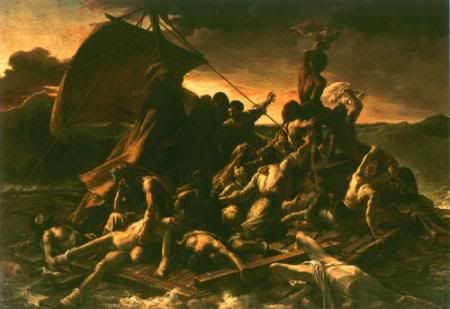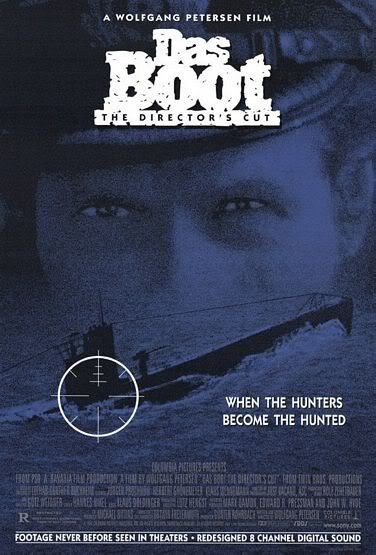Starring: Jurgen Prochnow, Klaus Wenneman, Erwin Leder, Herbert Groenemeyer
Directed by: Wolfgang Petersen
I've got my hands on the 210 minutes director's cut version of this movie instead of a mere 150 minutes original release. It took me several stops between the chapters in order to keep my fatigueness a little above sea level and subsequently, hushing away every movie appreciator's enemy, "boredom".
"Das Boot" is a really-heavy movie. There always seems a curtain of blackness and uncertainty hung on the screen for most of the movie's running-time. But it was a good thing, really. By the presence of that curtain, the viewer would surely be drawn from his seat with unknown tide that overflowing from the screen and instead of being outside of the screen, he will be there, among the crew of U-boat, criss-crossing in silence under deadly British destroyer above, 270 meters below the surface, wet, and in the ultimate desperation for a fresh-air. And then again, that's the very reason why i had to made a several stops between the chapters just so to keep my sanity intact.
"Das Boot" is a movie about a German submarine during World War II, set ashore with a mission to cut-short the allied supply ships in Atlantic by sunking them. Even though that the word 'claustrophobic' was entitled to it, the movie was not about claustrophobia. However, since the narrow (10 feet by 150 feet) interior of U-boat crowded with hundreds of German soldier crew was extensively explored by the movie-makers, it was easily observable how does the word 'claustrophobic' was entitled to it. The scene where camera rolls from deck to aft in a single cruise portraying the crew squeezing themselves to made at least enough room for a passing. Or how'd everytime the officer's had a meal in officer's room, some of the officers had to occassionally stand from their table to let some other crew passed them. It's horrible. I was totally unable to imagine a comfortness there.
The centerpiece of the film is an attack on an Allied convoy; the U-boat torpedoes three ships. We share the experience of the hunt; they drift below the surface, waiting for the explosions that signal hits. And then they endure a long and thorough counterattack, during which British Destroyers criss-cross the area, dropping depth charges. The chase is conducted by sound, the crew whispering beneath the deadly hunters above. It simply terrifying.
The next episode was said to had an endless discussion among movie-fans. Having finally outlasted the destroyers, the sub surfaces to administer a coup de grace--a final torpedo to a burning tanker. As the ship explodes, the captain is startled to see men leaping from its deck: "What are they doing still on board?" he shouts. "Why haven't they been rescued?" Drowning sailors can clearly be seen in the flames from the tanker. They swim toward the U-boat, their pitiful cries for help carrying clearly across the water. The captain orders his boat to reverse at half speed, to keep it away from them. What does he think of having let the victims drown? He does not say. Only one sentence in the ship's log ("assumed no men were on board") gives a hint.
The captain of the U-boat (Prochnow) was the center of attention in the movie. He was the figure of leader who his crew-mate, and officers alike depended upon. He was like a buoy, floating in a wilderness of storm, wide enough and strong enough to bear the hope of his crew. But, when the U-boat stranded in 270 meters below surface, and death -- either by the ocean pressure or lack of Oxygen -- was already peering on everyone's eyes we also see the human side of the captain. It was a side that rarely explored by Hollywood movies nowadays.
In comparison, this movie was populated by male actors. Much like Peter Weir's "Master and Commander: The Far Side of the World". But as much as liked the movie, Master and Commander would seem like a children -- a joyful adventure -- movie compared to the bleakness, grimness, and sadness that portrayed by Mr.Petersen here. In my opinion, it was an advantage that Das Boot choose German submarine instead of American submarine. Why? since by choosing a German submarine, they simply remove the patriotic element and increase the suspense. We identify not with the mission -- since if it was American, the mission would be succeeded with happy-happy-joy-joy celebration in the end --, but with the job.
Also inevitable, i remembered this painting while watching the movie.

Theodore Gericault's "Raft of the Medusa"
But instead of the wild ocean surrounding the devastated crew, it was the silence of ocean-depth which surrounds the terrified crew.

Rating: **** / **** - Take my advice, put a several stops between the chapters. With which the greatness of Das Boot shall be represented in its whole, un-affected by human fatigueness nor boredoms.